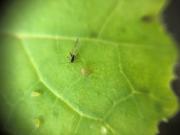Aphids – to spray or not to spray?
- Northam

Plant virologist Dr Benjamin Congdon (DPIRD) reports that there are higher levels of green peach aphids (GPA) in canola around Northam and Ben’s surveillance project had its first detection of turnips yellow virus (TuYV) in winged aphids in Northam.
Ben advises that any late canola crops in the Northam area that are still in the rosette phase are at risk of TuYV infection. However, most crops are flowering and not at risk.
Green peach aphid management
GPA are found on the underside of leaves.
GPA are resistant to many insecticides, and will develop resistance very quickly, so consider spraying only if these aphids are retarding crop growth and causing crop death.
Trials conducted by DPIRD have shown that GPA colonising canola in spring do not cause yield loss. If GPA colonise canola at the seedling stage and are not controlled leading to more than 600 aphids on leaves by 10% flowering canola then only those plants will incur a yield loss. For more information refer to DPIRD’s Canola yield loss to green peach aphid, Geraldton 2016 trial report and GRDC’s Yield loss to canola from green peach aphid page.
For more information refer to DPIRD’s Aphid management in canola crops page and GRDC’s Resistance Management Strategy for the Green Peach Aphid in Australia Grains.
Growers are reminded to contact Dr Paul Umina (cesar) on +61 (0)3 9349 4723 if you see GPA survive a Transform™ application.
Cabbage and turnip aphid management
The PestFax team has recently received reports of cabbage and turnip aphid activity in canola or on canola volunteers at;
- Toodyay
- Scaddan
- Dalyup
The department has undertaken extensive trials over several years to determine the optimal thresholds for cabbage or turnip aphid treatment. These trials have been funded by the Council of Grain Grower Organisations and GRDC.
Field and glasshouse trials have shown that it is the length of the cabbage or turnip aphid colony present on the flowering spike that causes yield loss. Cabbage aphid colony lengths of 2.5 centimetres or longer cause yield loss on the flowering spike that is infested. A small scale field trial has shown that if over 95% of the flowering spikes in a crop are infested, for every centimetre of colony length there is a 10% yield loss.
Trials have confirmed that the best bet threshold for cabbage and turnip aphid feeding damage is when 20% of plants are infested with aphids and aphid numbers are expected to continue to increase.
If spraying is required, a border spray may suffice for cabbage aphids, which are most commonly found within 20 to 30 metres of the crop edge.
Also consider insecticide options that are soft on predators if spraying. Predators such as parasitic wasps, hover flies and ladybirds will also increase with warming weather. If on close inspection the aphids look shiny and bloated, it means they have been parasitised by wasps. These predators can keep aphid populations below threshold levels.
For more information refer to DPIRD’s Aphid management in canola crops page.
For a list of insecticides registered for use on aphids see the department’s 2020 Winter Spring Insecticide Guide.
Growers and consultants can use the PestFax Reporter app to request or confirm identification of aphids found in crops.
For previous canola activity this season refer to DPIRD’s 2020 PestFax Issue 9 Green peach aphid and turnip yellows virus update article and PestFax Issue 5 article Aphid activity update.
For more information on identifying and managing canola aphids see DPIRD’s;
- Aphid management in canola crops page
- Diagnosing canola aphids page
- 2017 Protecting WA Crops Issue 3 newsletter Aphids – WA’s insect problem children
- Aphids in your crops YouTube video.
For more information on TuYV contact Dr Benjamin Congdon, Research scientist, South Perth on +61 (0)8 9368 3499.
For more information on aphids contact Svetlana Micic, Research scientist, Albany on +61 (0)8 9892 8591 or Alan Lord, Technical officer, South Perth on +61 (0)8 9368 3758.
Article authors: Svetlana Micic (DPIRD Albany) and Cindy Webster (DPIRD Narrogin).
